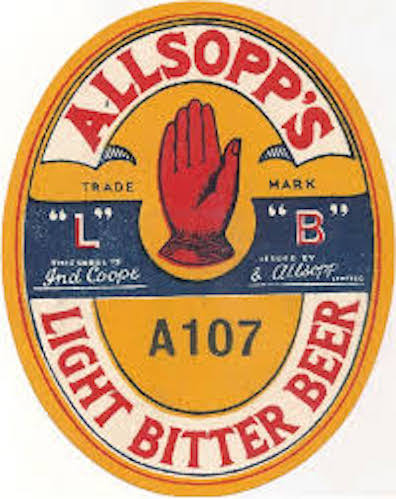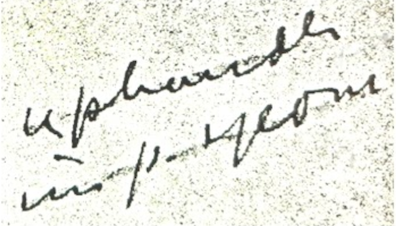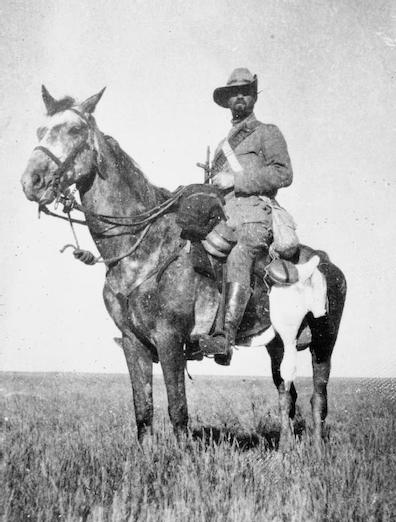Allsopp's, an English brewing company founded in
Burton-on-Trent in the 18th century (and acquired by Samuel
Allsopp in 1807) is mentioned twice in Joyce's novel. In Lestrygonians
Bloom thinks of Dubliners having a "bottle of Allsop" at
lunch. A much more puzzling reference comes in Cyclops
when Lenehan says that he will have "An imperial yeomanry,"
and John Wyse Nolan translates this to the barman as "a hands
up." Terry confirms the order: "bottle of Allsop. Right, sir."
For anyone familiar with Allsopp's, "hands up" should probably
not be too hard to fathom, as their bottles and ads all
display the image of a upraised red hand. But "imperial
yeomanry" takes obscurity a long step further. It links the
image of raised hands to British soldiers surrendering during
the second Boer War.
In a JJON note, Harald Beck observes that "A raised
red hand had been the Allsopp Brewery’s trademark since 1862.
In 1904 the company reminded the public that their Light
Dinner Ale was also called 'Hand Up' and was thus registered
and protected at the Patent Office." In Ireland the red hand
was additionally associated with the O'Neills of Ulster. A
little earlier in Circe the Citizen has sounded the
fierce clan's "tribal slogan Lamh Dearg Abu"
(Red Hand to Victory) and raised a glass "to the undoing of
his foes, a race of mighty valorous heroes, rulers of the
waves" (i.e., the English). But the two red hands have
different histories. Beck notes that although it "was a common
misconception in Ireland" to hear reference to the O'Neills in
Allsopp's trademark, in fact it was "simply a traditional sign
to signal that the inn in question sold ale of good quality."
The Allsopp's company website cites "an old story that
innkeepers sometimes displayed an open hand to indicate that
their ale was in good condition and ready for sale, and this
is where we believe that our Red Hand derives from."
But the image acquired new resonances from language coming
out of the Boer War. One of these terms was "uphander." Beck
notes (with thanks to four industrious colleagues) that
Joyce's notesheets from the summer of 1919 pair "uphander"
and "imp. yeom." and that an earlier draft of the Cyclops
passage has Alf Bergin ordering an "Uphander...
Imperial yeomanry, Terry." In Londinismen, a
German dictionary of English slang published in a revised
edition in 1903, Hans Baumann observes that "uphander" was
"first used in the South-African war in 1900" as a term for
soldiers who surrender in battle and obey the command, "Hands
up!” The term could apply to soldiers on either side, but the
men in Barney Kiernan's are thinking of the Imperial Yeomanry
Cavalry, a volunteer unit in the British army which suffered
many defeats in South Africa, especially in the battle of
Lindley in May 1900. Under the headline "Hands Up," a 14 March
1902 article in the Motherwell Times bemoaned the fact
that "An unprecedented and painful feature of the South
African War has been the constant succession of surrenders to
the enemy of unwounded officers and men."
Irishmen sympathetic to the Boers in their overmatched fight
against the imperial war machine apparently seized on this
image of British troops raising their hands in surrender. Late
in Circe, when a "bawd" proclaims that "The red's as
good as the green. And better. Up the soldiers! Up King
Edward!," a "rough" mockingly replies, "Ay!
Hands up to De Wet." This image, it seems, briefly
became linked in Dubliners' imaginations with the raised hands
on Allsopp's beer bottles. Beck and his collaborators have
turned up an article from the 15 July 1905 Evening
Telegraph about "a court case involving a Dublin
county publican who had sold beer of low quality under
Allsopp’s trade name." The article's headline reads,
"Allsopp's 'Hand Up'. A Reminiscence of the Imperial
Yeomanry."
Some Irishmen, many of them from Ulster, enlisted in the
Imperial Yeomanry. Among the 530 British soldiers captured at
Lindley on 27 May 1900 was James Craig, the future Prime
Minister of Northern Ireland. The Ulster connection may add
still another quirky insight into the evolution of these
strange ways of referring to beer. Beck writes, "The fact that
troops of the 60th (Belfast) Regiment of Yeomanry wore a badge
on their helmets featuring the red hand of Ulster on a white
shield may also have played a role in the coinage, just as the
fact that the directors of Samuel Allsopp and Sons Ltd., sent
600 bottles of their light and dark lager for the use of 500
volunteers to the Cape in January 1900." Irish volunteers in
the imperial war effort would have earned particular scorn
from Irish nationalists like those in the bar.
As it happens, Boers in South Africa were expressing similar
feelings of scorn with a word remarkably similar to "Uphander."
In a personal communication Vincent Van Wyk notes that the
Afrikaans term hensopper (hands-upper) was widely
applied to the National Scouts, Boers who had been recruited
into British military units after surrendering in battle.
Nationalists despised these hensoppers as traitors and
give-uppers, much as Irish nationalists despised the treachery
and ineffectuality of the Imperial Yeomanry. The English term
that Joyce used in an early draft of the Cyclops
passage seems close enough to "handsuppers" to suppose that
English and Irish troops coming back from South Africa may
have carried a linguistic parasite with them.
The head-spinning linguistic connections do not stop there.
Van Wyk notes that a kind of near-rhyme obtains between the
Hands-Up beer that John Wyse Nolan orders and the All-Sopps
that Terry delivers. This is not the kind of thing that would
have escaped Joyce's notice. The strangely intricate
linguistic associations in which he turned his mind
loose to recreate were not products of sheer will; he
regularly found them inscribed in the world around him. Van
Wyk spots another such uncanny coincidence in the historical
record. When Lord Kitchener met with the turncoat National
Scouts, it was in Belfast––"Belfast, South Africa that is!"



